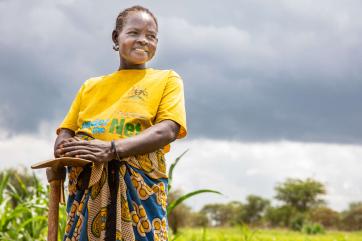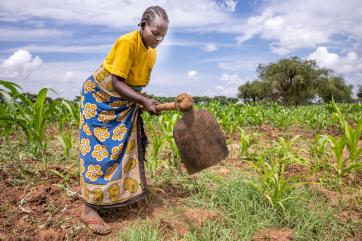One year in: Reflections on resilience

One year ago, Tjada D’Oyen McKenna joined Mercy Corps as our CEO during an unprecedented time. While our team members grappled with a global pandemic that affected every aspect of our programs and the communities where we work, we also faced a pivotal moment of change as an organization. We checked in with Tjada (pronounced Jay-dah, the “T” is silent) on her anniversary to reflect on her first year at Mercy Corps. From vaccine equity and climate change to building resilience and increasing diversity, Tjada shares what inspires her as she leads Mercy Corps forward.
How has it been leading Mercy Corps in the midst of the pandemic?
When I received a call about the CEO position, it was overwhelming to ponder taking the helm of an organisation during the middle of a pandemic that had turned our world upside down. But I realised that COVID‑19 had made Mercy Corps’ mission more urgent than ever—reversing decades of development gains, worsening conflict, and pushing millions of people around the world further into hunger and poverty—and that I could not pass up an opportunity to step up and serve at this moment when the need is so great.
While the pandemic has made it more challenging to come together in person, there’s a silver lining in that I’ve been able to connect with so many of our teams around the world very quickly—from Myanmar to the Central African Republic. Recently, I was on a video call with our leadership team in Somalia. One of the women on the team told me that she started in that office serving tea and now, more than 15 years later, she’s running the HR department for the Somalia office. Virtual visits have opened a door where it’s easier to meet more team members and hear special stories like hers.
Of Mercy Corps’ accomplishments in the last year, what are you most proud of?
When COVID‑19 hit, our team members doubled down in strengthening their support of communities in need. In more than 40 countries around the world where we work, I have been inspired by how quickly our global team adapted. They kept our programs going despite travel restrictions, supply chain disruptions, and the uncertainty we have all experienced with this virus.
Since March 2020, we have helped nearly 37 million people with our COVID‑19 response. In East Africa, we used SMS, WhatsApp, social media, and radio to spread timely and accurate health information about COVID‑19 to more than nine million farmers. In the U.S., we distributed $1 million in grants to over 200 Pacific Northwest small businesses to help them adapt. To help protect healthcare workers in Tunisia, we 3D-printed face shields for local hospitals. Across our programmes, we’re providing clean water, soap, and hygiene essentials to help more than 12 million people stay healthy and protect themselves from the virus.
Building resilience is one of our core beliefs: providing the tools and resources to help communities bounce back from the most challenging situations. COVID‑19 has been the ultimate resilience test for everybody. I could not be more proud of how our teams continue to do an incredible job helping communities, even when they are facing the challenges of the pandemic themselves.
We are also building resilience as an organisation by being transparent and taking responsibility for our past failures and taking action to become a stronger organisation because of them. We will not rewrite the history of abuse by Mercy Corps’ late co-founder Ellsworth Culver. Instead, we’re building a culture of integrity and accountability and putting in the resources and effort to improve our safeguarding systems, governance, and accountability. Through all of this, I have been continually inspired by our teams’ stamina and steadfast commitment to our mission and the communities we serve.
What weighs most heavily on your mind at the moment?
The first thing that comes to mind is how the pandemic has sharply worsened poverty, hunger, and inequality everywhere. We’ve lost about two decades worth of gains in poverty alleviation due to COVID‑19. How do we rebound from this?
Vaccine equity is a critical part of moving past the pandemic. We must fight for COVID‑19 vaccines to be distributed equitably around the world in order to fully recover together. Residents of wealthy and middle-income countries have received about 90% of the nearly 400 million vaccines delivered so far. We are urging the U.S. and other higher-income countries, as well as pharmaceutical companies, to take concrete action to address vaccine inequity and ensure vaccines can reach everyone, everywhere.
The damaging effects of the pandemic have exacerbated issues like natural disasters, displacement, and conflict over resources—already worse because of climate change. Our programming has focused on helping communities adapt to the climate crisis for many years now, and the need to support those who are most affected by climate change is more urgent now than ever: from helping farmers access solar-powered irrigation systems to connecting rural areas to sustainable energy.


The current situation in Afghanistan and the safety and wellbeing of our team members there also keeps me up at night. Our Afghan team members show a remarkable determination to continue supporting their communities. The scale of need for millions of Afghans today is stark. Although there are many unknowns to navigate, we won’t give up. We have been there since 1986 and we are determined to stay and deliver for the people of Afghanistan.
We serve communities in many places affected by conflict, and where security is a challenge. We find ways to work in the most challenging environments on the planet because that’s where we’re needed most. It’s in our DNA—it’s who we are.
What opportunities are you excited about as you look ahead for Mercy Corps and the humanitarian sector?
I’m really proud to be the CEO of Mercy Corps, and I’m especially proud to be one of the few Black women to have held the position as the head of an international NGO. And I’m proud to be doing it as a mother of two young children. I want to expand the imagination of what a CEO can look like, where a CEO can come from, and what stage in life a CEO has to be in.
I hope to attract more people from diverse backgrounds to Mercy Corps and to our sector and I’m committed to building diversity and equity in our teams, to represent the diversity of the communities we’re working with. One of the pathways to creating more inclusive teams in the U.S. is our partnership with Historically Black Colleges and Universities and Hispanic-Serving Institutions to connect Black and Latinx students with paid internship opportunities at Mercy Corps. By providing direct experience with our work, it’s my hope that students of color may find this is a place where they can thrive.
As an organisation, we are also thinking deeply about what it means to decolonise the humanitarian sector. It’s long overdue because for far too long white saviourism has shaped international aid. As a sector, we must confront our inequitable history and present, and create conditions where local communities have power, agency, and the tools to succeed. Though it may seem daunting to change the way our sector has operated for decades, we see it as critical in order to truly fulfill our mission.
All of the work we’re doing as an organisation is at the core of how we’re serving our participants—with intention and accountability. Looking ahead, I’m excited to see our teams carry out bold and innovative approaches to some of the most pressing challenges of the moment. We’re working hard to continue helping communities recover from the pandemic, adapting to climate issues, and meeting urgent needs while also providing long-term resilience for the people experiencing crises. Together, in collaboration with our communities around the world, we are taking action and creating lasting change for a better tomorrow.





